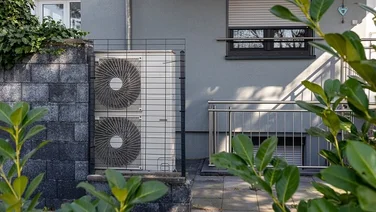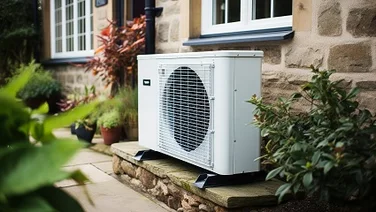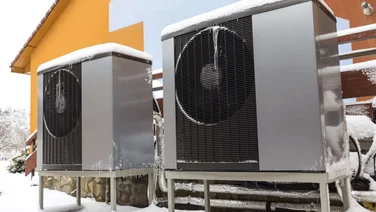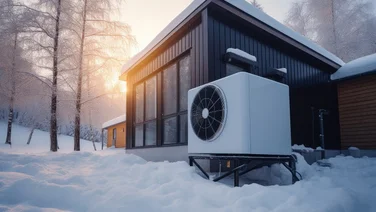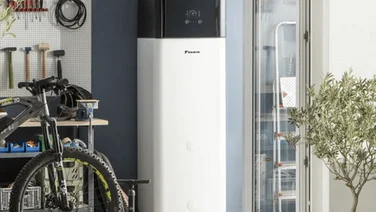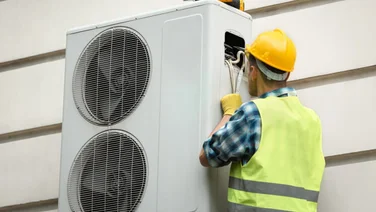We receive a small fee from trusted installers when you request a quote through our site. This helps us keep our content independent, well-researched and up to date – Learn more
- Heat pump cost calculator
- What is the average cost of an air source heat pump?
- What is the average cost of a ground source heat pump?
- What is the average cost of a water source heat pump?
- Heat pump installation costs
- Heat pump running costs
- Heat pump service costs
- What factors determine my heat pump's final price?
- Next steps
- Summary
- Heat pumps cost anywhere from £7,000 to more than £30,000 to buy and install
- An air source heat pump costs around £10,000 on average
- A ground source heat pump typically costs £24,000 for a horizontal installation
- Water source heat pumps can vary between £6,000 and £11,000
- Main pricing factors include the type of pump you choose, its size and capacity, and its efficiency rating

Heat pumps cost anywhere from £7,000 to more than £30,000 to buy and install, but with government grants like the £7,500 Boiler Upgrade Scheme, an air source heat pump can cost as little as £2,500 for a two-bedroom home depending on the size of your home and the type of heat pump you’re getting and before installation costs.
For many homeowners, these upfront costs can be a hurdle, but they do offer long-term energy savings. Studies show that when heat pumps are used in homes, energy demand can drop by 40%, according to the UK Energy Research Centre, with gas falling by 90% and electricity rising by 61%.
If you’re concerned you might not be able to afford a heat pump, it is well worth looking into available heat pump grants,the Boiler Upgrade Scheme as these can massively cut the price of a heat pump down.
You can also use our calculator to work out how much the installation will cost. Simply enter the heat pump you’re considering buying, how big your home is, and it’ll do the rest.
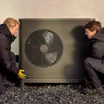
Get free heat pump quotes
Answer a few quick questions, and our trusted installers will send you bespoke heat pump quotes – for free.
Heat pump cost calculator
To be sure, though, we recommend getting quotes from heat pump installers, too. Simply fill in our form, and our trusted suppliers will be in touch with a quote.
What is the average cost of an air source heat pump?
There are three types of heat pumps: air source, ground source, and water source. Each type has its own size, and costs will vary depending on the size of your home.
Use the table below to see a rough estimate of the costs of each of these types in the UK:
| Property size | Two-bedroom | Three-bedroom | Four-bedroom | Five-bedroom |
|---|---|---|---|---|
| Air source heat pump size | 5 kW | 7 kW | 11 kW | 14 kW |
| Air source heat pump cost | £8,000 – £10,000 | £10,000 – £12,000 | £12,000 – £14,000 | £14,000 – £16,000 |
| Cost after government grants (assuming eligibility) | £500 – £2,500 | £2,500 – £4,500 | £4,500 – £6,500 | £6,500 – £8,500 |
| Ground source heat pump size | 4 kW | 8 kW | 11 kW | 13 kW |
| Ground source heat pump cost | £17,000 – £20,000 | £22,000 – £26,000 | £27,000 – £32,000 | £32,000 – £36,000 |
| Cost after government grants (assuming eligibility) | £9,500 – £12,500 | £14,500 – £18,500 | £19,500 – £24,500 | £24,500 – £28,500 |
*These costs are representative and don’t reflect exactly what you’ll pay. Heat pump installations are always priced on a case-by-case basis. Ground source heat pump pricing is based on a horizontal installation with trenches. The government grant considered is the Boiler Upgrade Scheme (BUS), which provides the first £7,500 of an installation (one per property).
As you can see, the average cost of installing a 5kW air source heat pump suitable for a two-bedroom home is £8,000–£10,000, falling to £500–£2,500 after the BUS government grant. For a larger three-bedroom property with a 7kW system, the average cost increases to £10,000–£12,000, or £2,500–£4,500 after support; a rise of roughly 25%.
A typical four-bedroom house requires an 11kW system costing £12,000–£14,000, or £4,500–£6,500 after the grant. For the largest homes, such as a five-bedroom property, a 14kW system averages £14,000–£16,000, leaving £6,500–£8,500 to pay even after funding.
Ground source heat pumps are significantly more expensive due to the extensive groundwork required for installation, which includes digging trenches to lay underground loops. This requires an expert installer, and this also contributes to the price.
A 4kW system for a two-bedroom home costs £17,000–£20,000, compared to £22,000–£26,000 for an 8kW system in a three-bedroom property, or about 30% higher. For larger homes, costs can reach £27,000–£36,000, with homeowners still paying £19,500–£28,500 even after the maximum £7,500 grant.
How much do air source heat pumps cost?
Air source heat pumps cost around £10,000 on average to buy and install for a three-bedroom house. The main factor that influences price is the capacity and size of the air pump, with larger homes requiring higher-capacity, costlier units, compared to smaller lodgings.
Without installation, air source heat pumps cost about £5,000-£9,000. This means that roughly half of your total cost goes to the installers.
However, it’s important to point out that air source heat pumps are slightly less efficient than alternatives. This is because while the temperature of the ground stays stable throughout the year, air temperature fluctuates, affecting the efficiency and long-term return on investment of air source heat pumps.
If you’re interested in learning more about the best air source heat pumps in the UK, please read our dedicated guide.
What is the average cost of a ground source heat pump?
A ground source heat pump costs significantly more to install than an air source heat pump, averaging about £24,000 for a horizontal set-up, due to the labour-intensive groundwork required to bury the heat pump loops.
What is the average cost of a water source heat pump?
The unit cost for a water source heat pump typically ranges from £6,000 to £11,000; however, necessary upgrades like new pipework or insulation, and sometimes upgraded insulation, as reported by Check A Trade, can add significant costs, ranging from £500 to £40,000 depending on home complexity.
As a result, water source heat pumps can vary between £6,000 and £11,000, but the additional upgrades you might need can vary between £500 and £40,000.

Get free heat pump quotes
Answer a few quick questions, and our trusted installers will send you bespoke heat pump quotes – for free.
Are there any grants for heat pumps in the UK?
Yes, there are government grants available to help reduce the cost of heat pumps in the UK.
The most common one is the Boiler Upgrade Scheme (BUS), where you can receive up to £7,500 to install an air source heat pump for your home. What’s more, earlier this year, Ofgem announced that you no longer need to have cavity wall or loft insulation to qualify for the scheme.
The initiative aims to encourage the transition from fossil fuel heating systems, such as gas boilers, to lower-carbon options such as heat pumps. With new heat pumps hitting the market from the likes of British Gas and Octopus Energy, homeowners are now able to buy a heat pump for practically nothing when using the grant.
Some manufacturers have also launched schemes themselves, such as Aira, which offers a monthly payment plan for heat pumps.
The Aira heat pump costs £4,000-£7,000 to buy and install for a three-to-four-bedroom home after the BUS discount, and also comes with a 15-year guarantee and a 15-year product and service warranty, which includes maintenance.
Want to get a better idea of what it’s like to own a heat pump? Check out our case study with Louise, from South London.
Louise had a 12-kilowatt air source heat pump installed to reduce her reliance on fossil fuels, and received £5,000 off the upfront cost through the Boiler Upgrade Scheme. Now, Louise can enjoy a warm, even temperature throughout the house, without fluctuations.
Take a look at the full interview with Louise to learn more.
Can heat pumps save me money?
According to the Energy Saving Trust, air and ground source heat pumps with a 300% efficiency rating can save the average household around £260 a year, assuming they are replacing an old G-rated gas boiler.
Generally, it is not profitable for domestic properties to install a ground source heat pump due to the high initial costs and demanding space requirements, making an air source heat pump the typically more worthwhile replacement for a gas boiler in the UK.
If your home is poorly insulated, you’ll waste more energy and save less. In a well-insulated home, with a highly efficient heat pump, one rated 350% or higher, you could save a lot more.
You also don’t need to replace a heat pump after 10 years, like a gas boiler. Air and ground source heat pumps typically last for 20 years.
And with electricity prices set to fall, gas prices on the rise, and heat pump technology improving all the time, switching over will soon become even more profitable.
Chris, an Octopus Energy customer, shared his savings journey: “My first full monthly bill, using only electricity, came to £170.95 for four weeks of running my home – heating it, providing hot water, charging my EV, and charging my storage battery. That works out to £43.75 a week for all of that!
“When spring and summer come, it’ll be even cheaper since I have solar panels and a solar diverter for the hot water tank, meaning less work for the heat pump.”
However, while it’s usually worth replacing a gas boiler with an air source heat pump in the UK, it’s generally not profitable for domestic properties to install a ground source heat pump, due to their high initial costs and space requirements.

Speaking on the subject on our Positive Energy podcast, Bean Beanland, director for growth & external affairs for the Heat Pump Federation, said: “You see headlines all the time that heat pumps are four-to-five times more expensive, but they’re not.
“The heat pump might be 50% more than the boiler, but that cost is the transition, and the transition is a one-off cost.”
You can watch his full interview on YouTube or below.
The most affordable heat pump option is an air-to-air single-room heat pump. These systems are best for heating/cooling individual rooms. If you want a heat pump to heat more rooms, or your entire home, the next best, cheapest option is something called an air-source heat pump (ASHP).
The latter can supply heating and cooling to each room using wall or ceiling-mounted units.
Heat pump installation costs
The average air source heat pump costs £10,000 to buy and install, while a ground source heat pump typically costs £24,000, if you choose a horizontal installation.
If you don’t have 700m2 of space for looped pipes, you can get boreholes drilled 90-160 metres down into your garden, but unfortunately, this is even pricier. A vertical installation costs £49,000, on average.
An air source heat pump costs about £10,000 to buy and install. In contrast, a ground source heat pump usually costs £24,000 for a horizontal installation.
If you lack the 700m2 of space needed for looped pipes, you can drill boreholes. They go 90-160 meters deep in your garden. However, this option is more expensive, with a vertical installation cost of £49,000, on average.
Ground source heat pumps are considerably more expensive than air source models because the installation process is longer, more complicated, and requires more specialised tools.
You probably won’t need to replace all your radiators, but most homes should expect to change one-third of them to ones that are 2.5 times larger than the standard size.
This is because a heat pump releases heat at a lower level than a gas boiler, over a longer period of time.
Their slow-release nature helps them to be more energy efficient. But this means you need either large surface areas in your heating equipment or insulation that retains the warmth from your heat pump.
You should hire a specialist to carry out the installation – it’s a complex process that only experts should take on. You can easily find qualified help with our list of the best heat pump installers.
Want to learn more? Check out our helpful guide on ground source heat pump installations.
A heat pump typically lasts between 15 and 20 years, though this depends on the type and how well it’s maintained. That said, you should expect an air-source heat pump to generally last that long, while ground-source systems can last far longer, typically up to 25 years for indoor units and 50 years or more for the underground pipework.
Heat pump running costs
On the face of it, a heat pump costs slightly more than a boiler to run. This is because heat pumps run on electricity and gas boilers run on gas, and electricity is more expensive than gas.
However, a heat pump uses much less energy than a boiler to produce the same amount of heat. As a result, running costs are not wildly different.
A ground source heat pump’s running costs for a three-bedroom home household will typically come to around £939 per year.
The average air source heat pump will cost about the same, though this can vary significantly, depending on where you live in the UK.
For more information on the benefits of getting a heat pump vs gas boiler, read our dedicated article.
| Heating method | Average monthly usage | Ofgem price cap 2025 | Standing charge | Monthly bill |
|---|---|---|---|---|
| Gas boiler | 960 kWh gas | 6.29p/kWh | 34.03p/day | £60.72 |
| Heat pump | 246 kWh electricity | 26.35p/kWh | 53.68p/day | £65.36 |
*Prices correct as of OFGEM price caps between 1 October and 31 December 2025.
In comparison, you’ll currently pay around £853 per year to run a gas boiler in an average three-bedroom home, which is slightly cheaper than a typical heat pump – but that’s likely to change.
In the long run, it will likely be cheaper to own a heat pump as gas prices will likely go up. As well as that, electricity costs will likely go down; this will definitely happen if the government removes green levies that artificially raise its price.
Regional temperature impacts maintenance costs, too. For instance, if you live in or towards the south of the country, it may already cost less to run a heat pump than a gas boiler, as it’s warmer than the rest of the UK.
How can I bring down heat pump running costs?
There are several ways you can bring down heat pump running costs.
- Make sure your heat pump is as efficient as possible – Your running costs may be lower if your heat pump has a higher efficiency rating than 300%, or if your insulation is better than average.
- Install insulation – This will help bring down heat pump running costs because your home will be more energy efficient. The heat from your heat pump will not be lost through the walls or ceiling.
- Double-glaze your windows – Again, this will mean your home will lose less heat than it otherwise would, meaning the heat from your heat pump will be much more effective.
- Get the right tariff – You can make big savings if you’re on the right energy tariff. Octopus Energy, the largest provider in the UK, claims customers on its Cosy Octopus tariff could save up to £496 a year.
It’s possible that your property might not be suitable for a traditional heat pump. If that’s the case, it might be beneficial to look into zero-emission boilers as an alternative.
Heat pump service costs
Heat pump service costs come to about £200 every two-to-three years, depending on which type of heat pump you have. If you carry out regular heat pump maintenance checks, your machine should provide you with warmth and hot water for at least 20 years.
You should have the heat pump serviced by a professional every two or three years, though, to make sure everything is working at peak efficiency.
This service will cost around £200 for an air source heat pump and £250 for a ground source heat pump, so check with your installer or the manufacturer if you can get a cheaper regular maintenance included in your purchase agreement.
And before the heat pump is installed, ask your installer to write down any maintenance checks you should carry out regularly. This list will include simple tasks such as sweeping any leaves, dust, or snow from the heat pump’s fans and cleaning the filter.
You can save money in the long run by keeping your heat pump functioning efficiently – and if you can take care of these jobs yourself, it’s free. As well as carrying out maintenance checks, you can also protect your heat pump system by getting a heat pump cover for the outside unit, which can guard it against extreme weather conditions and sea spray.
What factors determine my heat pump’s final price?
Several factors have a large effect on the cost of a heat pump, including type, size, and efficiency.
Certain brands will also charge more for their products, so make sure you get quotes from at least three different heat pump installers so you can compare prices properly.
The major disadvantage to a heat pump is that it will warm your home at a relatively slow pace, but as long as you switch on the heating a little bit earlier, you should be fine.
What type of heat pump do I need?
The type of heat pump is the biggest factor that influences price..
For instance, air-to-air heat pumps are typically five times cheaper than air source heat pumps or water source heat pumps. High-temperature heat pumps cost slightly more than regular systems, while ground source heat pumps are by far the most expensive option of all.
Air-to-air heat pumps usually cost between £2,000 and £4,000, and provide heating by taking the warmth from the air outside your property, running it through fan coil units, and blowing it into your home.
If you’re thinking about getting an air-to-air heat pump, read our dedicated page for more information.
High-temperature heat pumps can heat your home to the same level of warmth, in the same amount of time as a gas boiler, and cost £11,000 on average.
No matter what heat pump you choose to install, the price of installation will have a huge impact on the total bill. This is because some installations are more complex than others and require longer installation times.
What size heat pump do I need?
The size and/or capacity of heat pumps will also determine how much you’re going to pay. This is measured in nominal tons or British Thermal Units (BTU), a measure of heat or energy, according to CleanBC Better Homes.
The manufacturer says that one tonne of capacity is equivalent to 12,000 BTU per hour or 3.5kW.
So, since a typical residential heat pump usually ranges from one to five tonnes, its BTU will likely be anywhere from 12,000 to 60,000.
If you install a heat pump at the higher end of this measurement, the cost will likely be higher. However, it’s better to get the right size heat pump for your home, rather than trying to save money by getting a small model, to ensure it’s capable of meeting your heating needs.
Go too big and you’ll overpay for a heat pump that runs short cycles, which decreases its lifespan.
Go too small and your model will run constantly as it desperately tries – and fails – to reach your temperature needs, while racking up huge bills. Get the right size machine and it’ll run in the way it was designed. You can also use ‘VisitAHeatPump.com’ to see a heat pump in action if you’re concerned about how it works.
What heat pump efficiency do I need?
Heat pump efficiency is an important cost factor, too, as a more efficient machine will naturally cost more.
Air and ground source heat pumps usually have an efficiency rating of 300%. They can even reach 400% or 500%. This means they are up to five times more efficient than gas boilers.
Air-to-air and water source heat pumps also usually exist in this range, as do high-temperature heat pumps.
In the majority of cases, heat pump installations don’t require planning permission as they fall under permitted development, meaning no extra costs. However, you may need permission or a noise assessment if you live in a listed building, a conservation area, or if the system doesn’t meet noise or size limits.
Always check with your local planning authority before installation. Flat owners should also confirm with their freeholder or managing agent.
Next steps
If heat pumps seem like an affordable choice for you, the next step is to make sure that one can heat your house effectively.
During a cold spell, turn your boiler flow temperature down to 50°C (ask your manufacturer if you’re not sure how to do this), and see how it feels.
If you don’t notice any change, you’re ready for a heat pump. If you feel cold, consider getting additional insulation fitted in your home. You could also install bigger radiators and/or underfloor heating before you get a heat pump.
When you’re ready, our suppliers can provide you with quotes to compare the best prices – all you have to do is fill in this short form to get started.
Summary
- You can save money in the long run by keeping your heat pump functioning efficiently – and if you can take care of these jobs yourself, it’s free
- The ‘best type’ of heat pump will be dependent on your personal needs, which is why getting specific quotes is important.
- A ground source heat pump vertical installation with boreholes will increase the cost by more than double, at around £49,000.
- With a water source heat pump, costs can triple if you need to make other upgrades to your home
- Water source heat pumps are more consistent than air source heat pumps as natural water temperatures stay around 7°C to 12°C throughout the year.

Get free heat pump quotes
Answer a few quick questions, and our trusted installers will send you bespoke heat pump quotes – for free.


